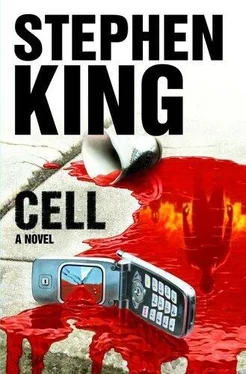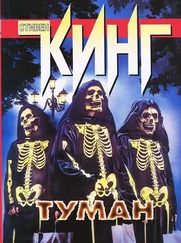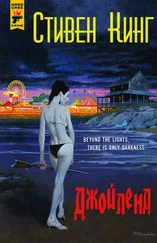"Clay, stop."
"And now . . . now . . ." He couldn't go on. And didn't have to.
"Come here, you guys!" Jordan called. His voice was agonized. "Hurry up!"
They went back to where Alice lay. She had come up off the ground in a locked convulsion, her spine a hard, quivering arc. Her remaining eye bulged in its socket; her lips pulled down at the corners. Then, suddenly, everything relaxed. She spoke a name that had no meaning for them– Henry—and squeezed the sneaker one final time. Then the fingers relaxed and it slipped free. There was a sigh and a final white cloud, very thin, from between her parted lips.
Jordan looked from Clay to Tom, then back to Clay again. "Is she—"
"Yes," Clay said.
Jordan burst into tears. Clay allowed Alice another few seconds to look at the paling stars, then used the heel of his hand to close her eye.
19
There was a farmhouse not far from the orchard. they found shovels in one of the sheds and buried her under an apple tree, with the little sneaker in her hand. It was, they agreed, what she would have wanted. At Jordan's request, Tom once more recited Psalm Forty, although this time he had difficulty finishing. They each told one thing they remembered about Alice. During this part of the impromptu service, a flock of phone-people—a small one—passed north of them. They were noticed but not bothered. This did not surprise Clay in the slightest. They were insane, not to be touched . . . as he was sure Gunner and Harold would learn to their sorrow.
They slept away most of the daylight hours in the farmhouse, then moved on to Kent Pond. Clay no longer really expected to find his son there, but he hadn't given up hope of finding word of Johnny, or perhaps Sharon. Just to know she was alive might lift a little of the sorrow he now felt, a feeling so heavy that it seemed to weigh him down like a cloak lined with lead.
1
His old house—the house where johnny and sharon had lived at the time of the Pulse—was on Livery Lane, two blocks north of the dead traffic light that marked the center of Kent Pond. It was the sort of place some real estate ads called a "fixer-upper" and some a "starter home." Clay and Sharon's joke—before the separation—was that their "starter home" would probably also be their "retirement home." And when she'd gotten pregnant, they had talked about naming the baby Olivia if it turned out to be of what Sharon called "the feminine persuasion." Then, she said, they'd have the only Livvie of Livery Lane. How they had laughed.
Clay, Tom, and Jordan—a pallid Jordan, a thoughtfully silent Jordan who now usually responded to questions only if asked a second or even a third time—arrived at the intersection of Main and Livery at just past midnight on a windy night during the second week of October. Clay stared wildly at the stop sign on the corner of his old street, where he had come as a visitor for the last four months. NUCLEAR POWER was still stenciled there in spray-paint, as it had been before he'd left for Boston. STOP . . . NUCLEAR POWER. STOP . . . NUCLEAR POWER. He couldn't seem to get the sense of it. It wasn't a question of meaning, that was clear enough, just someone's clever little political statement (if he looked he'd probably find the same thing on stop signs all over town, maybe in Springvale and Acton, too), but the sense of how this could be the same when the whole world had changed—that eluded him. Clay felt somehow that if he stared at STOP . . . NUCLEAR POWER with enough desperate intensity, a wormhole would open, some kind of sci-fi time-tunnel, and he'd dive into the past, and all this would be undone. All this darkness.
"Clay?" Tom asked. "Are you all right?"
"This is my street," Clay said, as if that explained everything, and then, without knowing he was going to do it, he began to run.
Livery Lane was a cul-de-sac, all the streets on this side of town dead-ending against the flank of Kent's Hill, which was really an eroded mountain. Oaks overhung it and the street was full of dead leaves that crackled under his feet. There were also a lot of stalled cars, and two that were locked grille to grille in a strenuous mechanical kiss.
"Where's he going?" Jordan called behind him. Clay hated the fear he heard in Jordan's voice, but he couldn't stop.
"He's all right," Tom said. "Let him go."
Clay wove around the stalled cars, the beam of his flashlight jigging and stabbing in front of him. One of the stabs caught Mr. Kretsky's face. Mr. Kretsky always used to have a Tootsie Pop for Johnny on haircut day when Johnny was Johnny-Gee, just a little guy who used to yell fo-fo-me-me when the phone rang. Mr. Kretsky was lying on the sidewalk in front of his house, half-buried in fallen oak-leaves, and his nose appeared to be gone.
I mustn't find them dead. This thought drummed in his mind, over and over. Not after Alice. I mustn't find them dead. And then, hatefully (but in moments of stress the mind almost always told the truth): And if I have to find one of them dead. . . let it be her.
Their house was the last one on the left (as he always used to remind Sharon, with a suitably creepy laugh—long after the joke had worn thin, actually), and the driveway slanted up to the refurbished little shed that was just big enough to park one car. Clay was already out of breath but he didn't slow. He sprinted up the driveway, kicking leaves in front of him, feeling the stitch starting to sink in high up on his right side, tasting copper in the back of his mouth, where his breathing seemed to rasp. He lifted his flashlight and shined it into the garage.
Empty. Question was, was that good or bad?
He turned around, saw Tom's and Jordan's lights bobbing toward him down below, and shone his own on his back door. His heart leaped into the back of his throat at what he saw. He ran up the three steps to the stoop, stumbled, and almost put his hand through the storm door pulling the note off the glass. It was held by only a corner of Scotch tape; if they'd come along an hour later, maybe even half an hour, the restless night wind would have blown it over the hills and far away. He could kill her for not taking more pains, such carelessness was just so Sharon, but at least– The note wasn't from his wife.
2
Jordan came up the driveway and stood at the foot of the steps with his light trained on Clay. Tom came toiling along behind, breathing hard and making an enormous crackling sound as he scuffed through the leaves. He stopped beside Jordan and put his own light on the scrap of unfolded paper in Clay's hand. He raised the beam slowly to Clay's thunderstruck face. "I forgot about her mother's fucking diabetes," Clay said, and handed over the note that had been Scotch-taped to the door. Tom and Jordan read it together.
Daddy,
Something bad hapen as you porbly know, I hope your all right & get this. Mitch Steinman and George Gendron are with me, people are going crazy & we think its the cellphones. Dad here is the bad part, we came here because I was afraid. I was going to break mine if I was wrong but I wasnt wrong, it was gone. Mom has been taking it because you know nana is sick and she wanted to keep checking. I gotta go Jesus I'm scrared, someone killed Mr Kretsky. All kinds of people are dead & nuts like in a horra movie but we heard people are getting together (NORMAL people) at the Town Hall and thats where we are going. Maybe mom is there but jesus she had my PHONE. Daddy if you get here okay PLEASE COME GET ME.
Your Son, John Gavin Riddell
Tom finished, then spoke in a tone of kindly caution that terrified Clay more thoroughly than the most dire warning could have done. "You know that any people who gathered at the Town Hall have probably gone many different ways, don't you? It's been ten days, and the world has undergone a terrible convulsion."
Читать дальше








